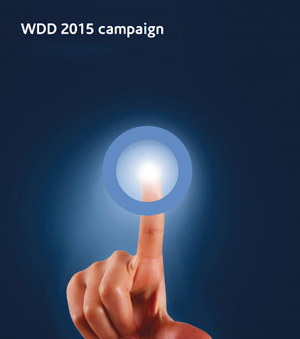Sunday Feb 22, 2026
Sunday Feb 22, 2026
Saturday, 14 November 2015 00:00 - - {{hitsCtrl.values.hits}}

Lanka Hospitals is marking World Diabetes Dayby helping Sri Lankans with the knowledge to prevent, detect the condition early and effectively manage diabetes to minimise negative effects and achieve a better quality of life.
As the world marks World Diabetes Day on 14November, Lanka Hospitals will hold an exhibition with stalls dedicated to different aspects of the disease and also offer diagnostic services for a nominal fee to the visiting public.
“Diabetes is the fastest growing non-communicable disease and The World Diabetic Day is important for us as its prevalence of the disease is rapidly increasing in South Asian countries such as Sri Lanka compared to Europe or the USA,” said Dr. NiroshiniYahampath, Consultant Endocrinologist at Lanka Hospitals.
“This is probably due to the changing lifestyles including food, lack of exercise and Asian genetics that appear to be more vulnerable to diabetes.There should be more awareness and prevention taking place in terms of children, teenagers and young adults as the numbers have been slowly increasing over the last few years,” she added.
Diabetes is a condition where the mechanism of regulating the level of sugar in a person’s bloodstream malfunctions.
There are two types of diabetes. Type I diabetes, which has a genetic origin is less prevalent. Here, the Pancreas, the organ which produces the hormone Insulin, to regulate sugar in the blood, stops working. Type I is seen in children and young adults and is also called ‘insulin dependent diabetes’.
The more common variety is Type II. “98% of the diabetes population fall in to this group. Before their blood sugar is elevated they become insulin resistant. Intervention with lifestyle modifications and medication, diabetes can be prevented in this group. Type II diabetes can be managed with tablets and some may require insulin,” Dr. Yahampath said.
“People need to be aware that diabetes is a ‘chronic’ disease and one thatpersists. Though there is no cure for diabetes, one can manage it without worrying about low life expectancy,” Dr. Yahampath said. “But one has to be mindful to maintain a healthy lifestyle, with the right type of food and exercise. Medication will be lifelong unlike a course of treatment forpneumonia, cold or a cough.”
If diabetes is not managed effectively, high levels of sugar can damage organs such as the eyes, heart and/ or the nervous system. Nerve damage or neuropathy, might initially be felt as ‘pins and needles’ in parts of the body and later there will be no sensation at all.Infection can spread easily because of the lack of ‘feeling’, causing eventual amputation.
Frequent thirst, frequent urge to urinate, pins-and-needles sensation, blurring of vision, lethargy may be symptoms of being a diabetic.
“What is dangerous is that some might not exhibit any symptom at all until they walk into a hospital with a heart-attack where the sugar level is found to be very high,” says Dr. Yahampath. “It is not that the sugar level has risen at that moment but he or she may been having diabetes for a while and it was detected only after a complication.”
“Hence it’s important that high-risk population should be very cautious and should check for diabetes at a younger age. The 40+ age group should undergo a test at least once a year.” On 14November from 9a.m. onwards, Lanka Hospitals will have clinical stalls dedicated to diabetic heart, kidney, foot and insulin, physiotherapy and exercise, staffed by consultants, doctors, nurses and technicians, who will be ready to meet the public.